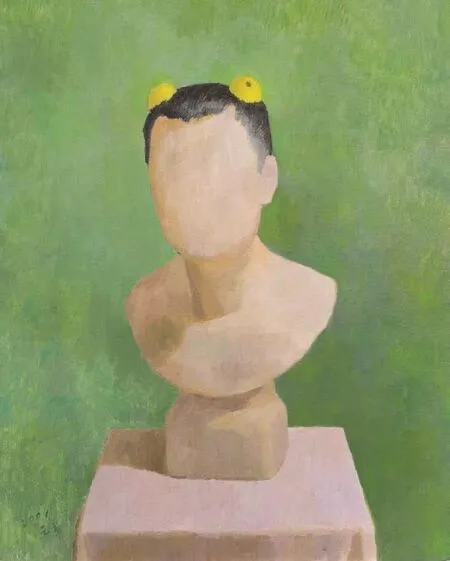TECHNIQUE AND MANIPULATION
TECHNIQUE AND MANIPULATION
A background in theater and dramatic contrasts of emotional subtlety mark Wang Yin's works with distinct theatrical resonance. This resonance is made all the more effective through “The Gift”,an exhibition at UCCA. Divided into three sections, “Departure”, “Sojourn”, and “Return”, the artist inspects his personal as well as Chinese art's history in these works. Follow ing both a chronological sequence and narrative sequence, the three parts form a totality where the artist's intention seem s easily accessible yet elusive.

Se lf-portrait No.4, 2009
W ith “Departure”, the exhibition sets off with Wang Yin's iconic series, “Filling Station”. Though com parable to works on the same subject by Edward Hopper and Ed Ruscha, Wang Yin's portrayal hits viewers w ith a defnite blow of solitude. Although the artist strips the work of any direct symbols that may give a defnitegeographical identity, the “Russian Train” series seem to point to the beginning of Chinese Western art in the Peop le's Republic of China,whose contem porary artistic traditions as well as political foundation are inseparable from Soviet in fuences. As the communist state grew, the increase in symbolism in Wang Yin's works—such as mangoes (gifted to M ao by foreign guests who then gifted them to the Red Guards) and the nude series,which coincides w ith the pervasiveness of symbols in Chinese art in the 60s and 70s—is more than an intentional artistic-political allusion. The idea of early development of Chinese Western art as “im ported” is conveyed in his other pieces as well.

Wang Yin (王音)
Born in 1964, Wang Yin studied stage art at the Central Academy of Drama. Having been in exhibitions held in Germany, Spain, and Japan in addition to China, he now works and lives in Beijing. H is works, though often seem ingly removed from reality,seek to interact with their viewers.

Northw est, 2015
In “Sojourn” and “Return”, Wang Yin's background in theater becomes more apparent. Rather than aim ing for realistic rendering and detailed depiction, he uses broad strokes to em phasize gesture, movement, and the contrast of light and shadow. Perhaps owing to his background in theater, Wang is particularly adept at conveying a mood via physical characteristics and lighting, reappropriating regional landscapes into alienated scenes of mundane laborers. For instance, two works focusing on silhouettes, “Northwest (Afternoon)”and “Zhong X iao X ian Lu”, of a man in what seem s like worker's uniform biking along your typical Northwestern China solitary street scene w ith the sun casting its chilled light, the other of a balloon vendor trudging along a nondescript street, his dark fgure, half blocked by bright red balloons, seem ingly weighed down by the tedious task of making a living.
Infuenced by Jerzy Grotowsky and Samuel Beckett, Wang Yin exp lores the idea of one man as theater, as stage, in his paintings. In the same way that “poor theater” elim inates the excessiveness of stage settings, Wang Yin strips away visual elements and context in his works to enact dramatic impact, as most visible in “Sojourn”,where the artist focuses on mundane fgures and scenes of normality, or in other words, poor people. H is paintings build an emotional connection with the audience, via the fgures' contour, body language, very few objects providing context,and light and shadow. Wang Yin's manipulation of color, of texture, draws the viewer into the painting,“Entrance to a Village”, as if one ca feel the afternoon sun casting shadows, Though subjects in his works seem forever suspended in a moment on a prolonged, end less, idle afternoon their dramatic power enables and compels viewers to feel the “mood”and inane theatricality. Whether it's the man with white hair sitting on a stool while holding a newspaper, or the garbage picker standing slightly crouched with tongs in one hand and a garbage bag in another, or even the men carrying a huge rock on the plain terrain of the Northwest—it is technique and manipulation that “paints” nostalgia and melancholy in the empty air.
- WEIJING ZHU (祝伟婧)

